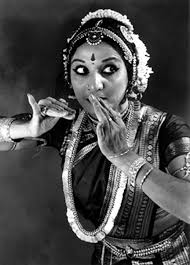MENAKA THAKKAR— A LIFE DEVOTED TO DANCE
Posted by Deirdre | Filed under Blog
Indo-Canadian dancer Menaka Thakkar lived to dance. A world-renown expert in such classical Indian dance styles as Bharat Natyam, Oddisi and Kichipudi, she passed away in Toronto earlier this month from Alzheimer’a disease. She was 79. I remember her here, in a story we did together in 1999, on the eve of the premiere of an epic dance work she made about Mahatma Gandhi. R.I.P.

She looks like a bird of paradise, in her dangling jewellery and jewel-hued silks. And she’s well aware of her own exoticism. “This is me,” classical Indian dancer Menaka Thakkar declared, fingering the gilded edge of her peridot-green sari. “I will never wear anything else. Not even jeans to shovel the snow.”
A resident of Toronto for the last 25 years, the 58-year-old Bombay native knows the terrors of a Canadian winter. She now avoids them by going back to her homeland each January, to give her 80-year-old guru an update on her progress in the New World. Her training is in Bharat Natyam, Odissi and Kuchipudi, centuries-old Indian dance forms.
Thakkar presents a fusion of styles gleaned from her experiences in Canada, and her teacher is very impressed. “Indian dance has the capacity to express anything,” she said. “I always want to expand my range. And dance has never let me down.”
In the past, Thakkar has used Indian dance to address the exploits of Krishna (as in 1995’s full-length Sitayana)and her own life in a cold environment (1997’s Duality, danced with Toronto modern dancer Claudia Moore). Next week, she fuses the past and the present in an original multimedia production that has its world premiere at Toronto’s Ryerson Theatre on Thursday night.
Mukti Nad (Call of Freedom) is based on the life of Mahatma Gandhi. Thakkar created it with the help of brother Rasesh, former director of Indian studies at York University. The dance-drama is epic in scale, including period newsreels and poetry narrated in 12 of the languages of India. Thakkar, who characteristically will present a pastiche of dance styles to capture the sweep of her subject, is aiming to present a contemporary history of a complex country, and the man who dared open its latest chapter.
“I want to pay tribute to Ghandiji and talk about his unique freedom fight,” she said, her soft voice full of passion. “His story isn’t just about politics. He won us our independence. He sparked a tremendous transformation in India that wrought great social and cultural changes.”
Thakkar benefited from some of those changes, through Gandhi’s unprecedented social reforms for women. Thakkar’s father, an enlightened Bombay lawyer, encouraged his daughter to get a university education and sponsored her dance studies, as a way of ensuring that she never depend on anyone else for her livelihood. With kohl-lined eyes as dark as the bindi she wears on her forehead, Thakkar insists on calling herself a traditional woman. Yet, she is an emancipated traditionalist who clings to her independence.
She has never married. When she was younger, she bullied her four siblings to likewise avoid marital vows, but for the most part they ignored her. She has no regrets about the path her own life has taken. Dance is her life. “I am married to dance,” she said, clasping her hands as if in prayer.
